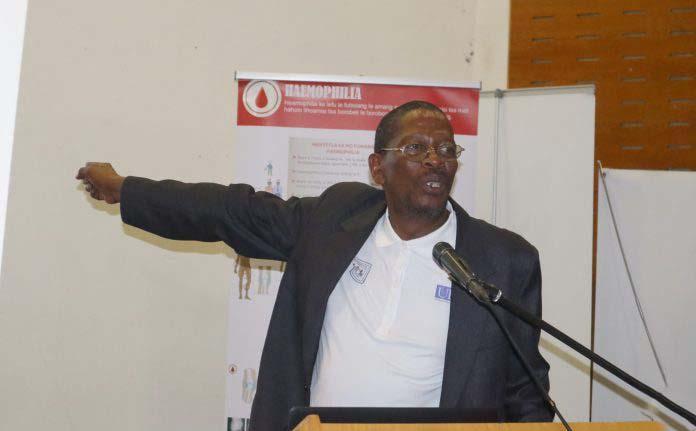Africa-Press – Lesotho. Mokhethi Moiloa, who lives with hemophilia, says it is not easy to live with the disease as one always has to ensure that they don’t bleed at all. Hemophilia is an inherited bleeding disorder in which one’s blood does not clot properly.
Moiloa says living with this condition is very challenging but with treatment, victims can manage their bleeding symptoms, while lack of information to people who are around him poses a major challenge.
“As I look back, my childhood was affected more than I realised at the time. I lived in a small community where it is hard to get support from within the community,” he added.
There were no resources available for his parents to manage the condition and it was difficult to receive treatment. He wishes injections could be availed to patients in their respective homes because hemophilia injections are only available at health facilities.
He urged the government to make screening treatment accessible, affordable and refill systems networks to be available at the main concentration services and camps because there is evidence that some lives are lost due to hemophilia.
Most people who have hemophilia are said to be mostly males, while women are mostly carriers of the disorder. Hemophilia is a rare disorder in which blood does not clot normally because of lack of sufficient blood clotting proteins.
According to Centre for Disease Control and prevention (CDC), it is a condition caused by a mutation in one of the genes, that provides instructions for making the clotting factor proteins needed to form a blood clot.
This change can prevent the clotting protein from working properly or it could be missing altogether. The best way to treat hemophilia, CDC says, is to replace the missing blood clotting factor so that the blood can clot properly.
Another patient, Ramolibeli Mohlali, said failure to afford payment for their treatment is another challenge, especially when the treatment is available.
He said they are now able to receive treatment in the form of injections from two healthcare facilities, namely; Queen ’Mamohato Memorial Hospital (QMMH) and Queen Elizabeth II Hospital.
It is said to be a big challenge for people with hemophilia as they only access medication in Maseru, forcing people from other districts to travel to Maseru.
For his part, the association’s marketing and public relations officer, Mofota Makoae, said people from districts like Qacha’s Nek, Mokhotlong and Mohale’s Hoek are able to get treatment from the district’s hospitals, only on request.
At times when those facilities at the districts run out of services, patients will be transferred to Maseru while patients from other districts get treatment from Maseru.
On the other hand, cancer and palliative care advocate, Sejojo Phaaroe, from the Minister of Health said the ministry supports the hemophilia association with information dissemination to make sure that diagnosis becomes easier.
He said they focus on the treatment guidelines, helping the association which is working with health professionals to accommodate them at their facilities in information dissemination countrywide.
The chairperson of the hemophilia association of Lesotho, Moeketsi Mootisa, said they are planning to engage the public, to give correct information on how best one can care for victims.
He said proper treatment can make life easier for people with hemophilia along with family members and friends of such people as they will be equipped with information on how care for and support them.
“We are working together with the Ministry of Health to ensure that victims are not alone in the fight,” he said. He also noted that they are working together to reduce the high costs of treatment so that it becomes affordable to everyone.
In collaboration with the Ministry of Health, the association recently held the first teachers’ training programme in the country about the condition. The training was held at the Ministry of Health to equip teachers on hemophilia.
The association further notes that it is aware that few people know about hemophilia so it has stepped up efforts to raise awareness about the disorder. The training was of pre and primary school teachers as they are the first to encounter early childhood signs and symptoms.
On behalf of teachers who attended the training, Mothobi Pinda, said the training helped them as they will be able to identify learners who display the symptoms, and assist those who live with the condition.
He said the training is an eye-opener as his work allows him to work directly with learners so he is going to approach them in a different manner. “I am very grateful to be part of the training, and going forward, I pledge my full support,” he added.
The training was done because Lesotho is lagging behind in terms of management of hemophilia, including how to take care of hemophilia patients as well as how people can trace those with the disorder.
https://publiceyenews.com/the-difficulty-of-living-with-hemophilia/
For More News And Analysis About Lesotho Follow Africa-Press






